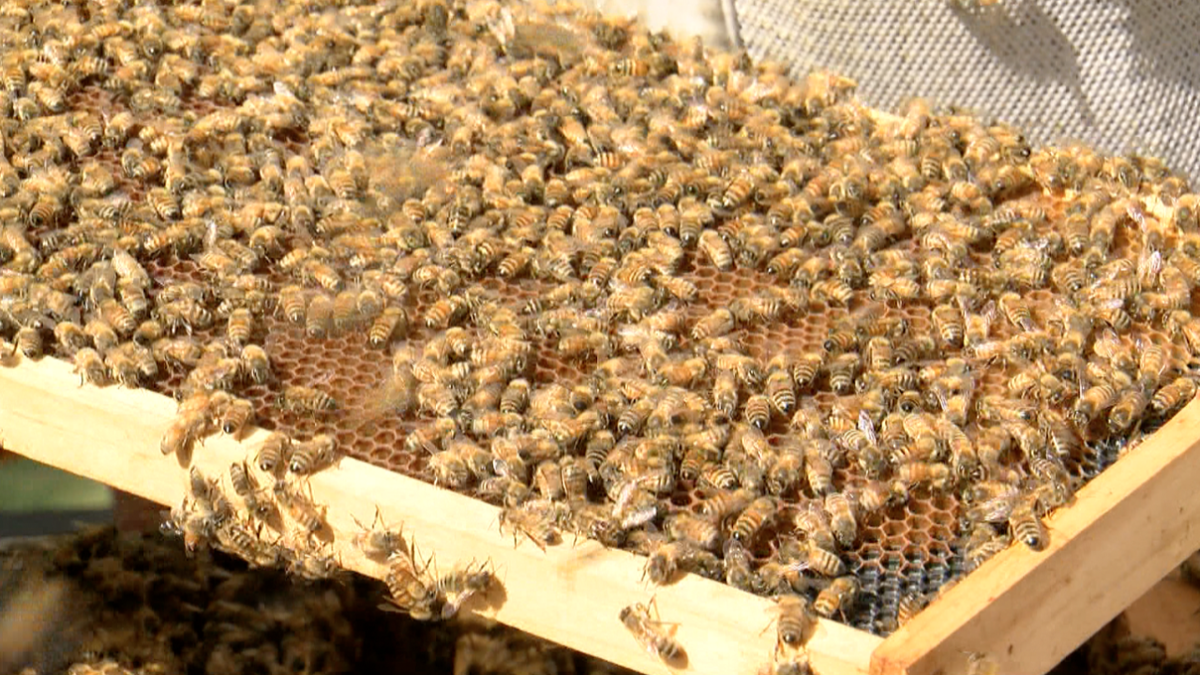‘Silent City’ honey is just a drop in the jar of Forest Home Cemetery’s environmental focus

The 189-acre grounds is the first certified arboretum in Milwaukee.
By Sarah McGrew
Click here for updates on this story
MILWAUKEE (WTMJ) — It may sound strange to think of a cemetery as a resource for the living, but that’s exactly what Forest Home Cemetery in Milwaukee says it is.
The 189-acre grounds is the first certified arboretum in Milwaukee. On any given day you can see joggers, dog walkers or even people enjoying a picnic on the grounds. You can even buy honey from bees kept on the property.
“Some people say they’re dying to get this honey,” said Forest Home Cemetery Beekeeper Chad Nelson.
Charlie Koenen, the executive director of Beevangelists, said “the puns flow like honey.”
Koenen and Nelson’s work happens on the second floor of a building on the grounds. Their honeybees produce hundreds of pounds of honey a year. The honey is bottled and sold under the label ‘Silent City.’ The proceeds benefit the not-for-profit cemetery.
It may seem like an odd combination, but the pair of bee experts say the expansive grounds with trees more than 100 years old is an ideal location to keep bees.
“Their roots are deeper, it has a different flavor of honey,” Nelson said of the honey the Forest Home bees produce.
But the honey was always just a byproduct of something bigger.
“The neat thing about the honeybees in a situation like this is we can use it to promote the good things that we’re doing here,” Koenen said.
That’s where Aesthetics Coordinator, AKA the bee feeder, Molly Barwick comes in.
“We really are trying to spread the word of eco-friendly. We are trying to be more eco-friendly ourselves, especially in this traditional setting,” Barwick said of initiatives going on at the cemetery.
In her seven years working at the cemetery, she’s worked to do things like replace annual flower beds with perennials. Between the bees and an increase in native plants, Barwick said there’s already been notable changes on the grounds, and in the air, like an increase in monarch butterflies.
“I never saw them my first couple of years here. And now we have all these milkweeds so you’ll see them all around and I’ve seen more monarchs here this year than I have in my entire career,” Barwick shared.
Koenen said the changes in the cemetery are about rethinking the way we’re living.
“The earth that we inherited came to us because of the work of pollinators, primary of the pollinators are the bees,” he said.
But according to the Center for Biological Diversity, 40% of bee species in the world are vulnerable to extinction due in part to human-driven climate change.
Honey may be all the buzz, but Nelson said beekeeping isn’t necessarily the route to take for those looking to save the bees.
“Beekeeping is great, but I don’t think it’s the answer. This is the gateway to the answer. I think you have to become a beekeeper to realize that the other types of bees are the ones that are really struggling,” Nelson said.
Koenen shared that those wanting to save the bees should instead turn to what the bees need.
“Start building little gardens with plants that are native to your area,” Koenen suggested. He’s also an advocate for ‘No Mow May.’
“Enjoy life a little bit, then get around to cutting the lawn and you’ll be a far better savior of the bees than if you became a beekeeper,” Koenen added.
But it’s not just saving the bees that planting native plants will do. Koenen and Nelson put it simply.
“No bees, no food,” Nelson said.
“No bees, no life,” Koenen added.
So maybe, it’s more accurate to say, the Silent City honey isn’t something to die for but rather something to live for.
Please note: This content carries a strict local market embargo. If you share the same market as the contributor of this article, you may not use it on any platform.
